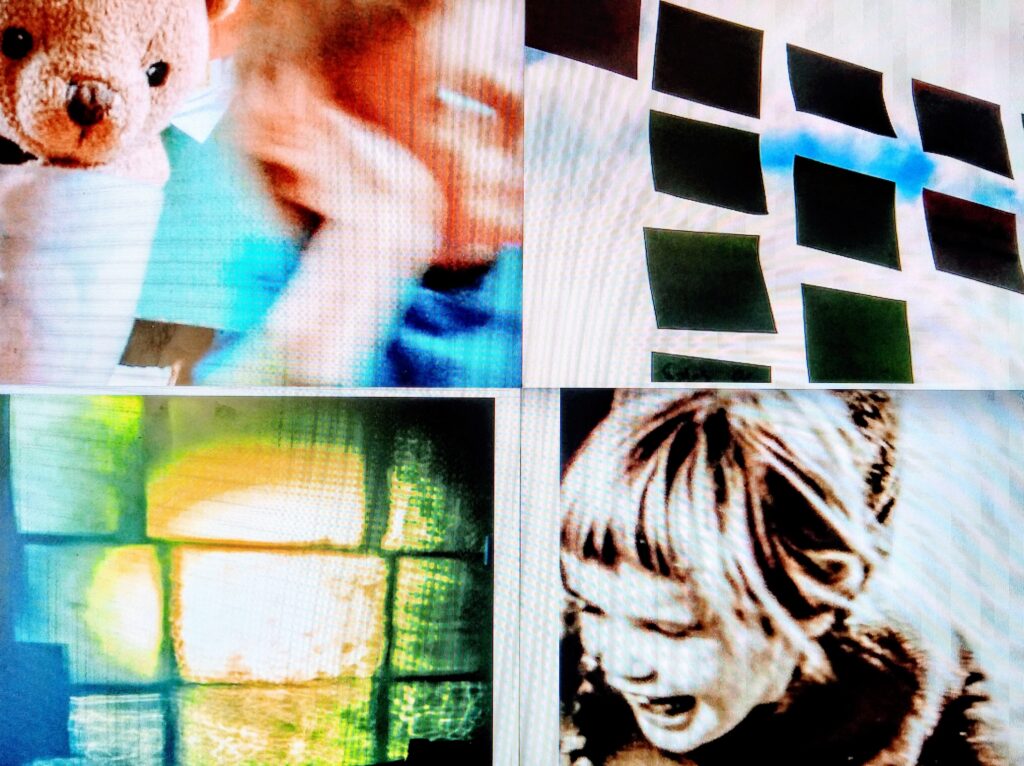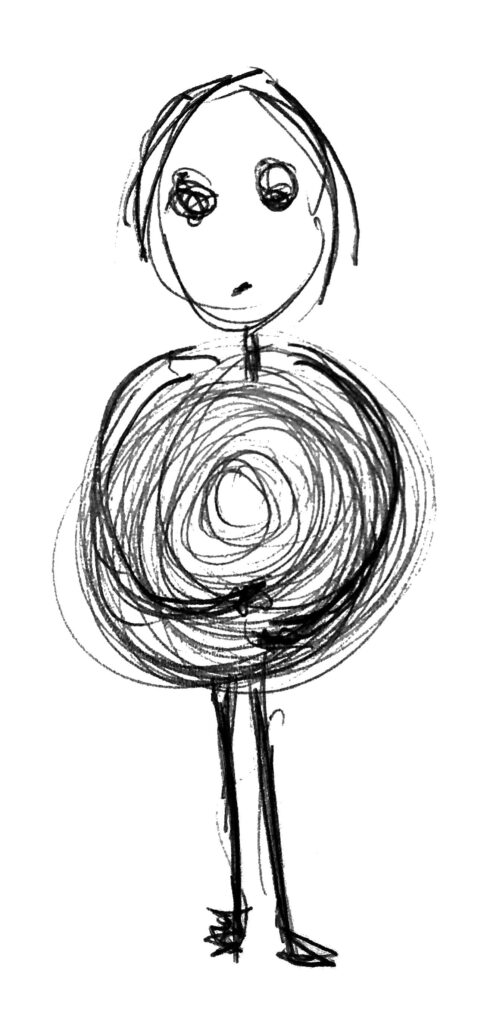
For this Understory Conversation, Georgia Gildea and Charlotte compare notes on hugeness, need and containment.
The Hugeness There’s a hugeness inside me that can’t be talked down. Can’t be left alone. I have not yet worked out how to feed it. When ignored it grows wild, hurls me its frustration, takes up all the space. This hugeness – my hugeness – does not mean harm. It can be so tender. It points out the rocks, the bluebells, sky. It curls up soundly when I write, or when I am drawing. And in dreaming. But it fears days. Long days when I have to leave it, take the bus away, tend the child who has hugeness, too. By the time I’m home it has imploded, lies kicking on the floor. Baby-hugeness shredding the air with cries. I try to take it for a walk. But it will not go. It wants nothing. It wants everything. I wait an hour. Then I whisper: Hugeness, I am here. It pretends it’s sleeping. And I wait. Georgia Gildea
Charlotte Gann: Georgia, I respond so much to this framing of a ‘hugeness’: ‘Hugeness, I am here’. I have a ‘hugeness’ inside me too. It’s partly what I think I was trying to express in writing my collection The Girl Who Cried.
I love the abstractness yet directness of your framing. And I love your name for the concept: Hugeness.
I’m also really struck by the relational aspect in the poem, between you, the poet, and your hugeness. You know all about this hugeness, you are aware of it, in conversation with it. It’s ‘tender’ and vital, and ‘can’t be talked down’. And it ‘fears’ those ‘Long days’ when you have to be out. I recognise all this, without feeling I’ve seen it expressed anywhere quite like this before. And I love the ending of your poem, ‘And I wait’. The good mothering you’re giving it.
I also have a line in one poem ‘Do we carry the babies we were / inside us our whole lives?’ Does this relate for you to your ‘hugeness’?
Here, by the way, is the picture I’ve sketched for my working document on my current set of poems…

I think that looks like someone carrying a ‘hugeness’ inside. Do you?
Georgia Gildea: I’m so glad the poem resonated with you.
I wrote the first draft on my phone while I was waiting for the decision on my PhD funding (which arrived – negative – about an hour after the poem) and I could feel this thing inside me just going crazy with anxiety and need, physically bashing around: painful.
I started the poem as a way of containing my anxiety in the moment, trying to ‘see’ this wild, pained, needy thing in me more clearly. (Maybe that’s where the relational aspect you notice came in. I think sometimes to name or separate a part of ourselves, in order to look at it, and put it back, can help. Especially if there’s a poem involved, in which case you’ve ‘caught’ it and held it in form). The word ‘hugeness’ came instantly, and felt right. I’m also glad I now have a word for something that has been central to my life experience – my own word.
I find it interesting how sometimes the poems we write ‘just for ourselves’ can reach others deeply. As soon as I’d finished it, I sent the poem to my sister who instantly recognised ‘hugeness’ as something she carries too.
The nosy part of me now wants to know about everyone’s hugeness: how it feels to them, what form it takes, how they tend to it. I wonder if us humans who are actively engaged in living creatively feel it more pressingly. I also think it links (for me) with need, and with hunger. And all the anxieties I feel around those things.
The baby aspect of it is absolutely central, I think. (And by the way, I love that line in your poem: I remember reading it and thinking wow, this poet is GOING there! And being so thrilled that someone was.)
Your image is so moving. It looks like the figure’s upper body has been taken up by something overwhelming – which is just what happens with me. And what strikes me most is the empty ‘O’ at the heart of all that swirling mass. I think at the core of my hugeness is an awareness of some emptiness, or part that can never be filled – or only filled in moments. But maybe that empty ‘O’ is also somehow vital to our creativity?
CG: Yes, to all this, Georgia. It really helps me, too, to give a name to something – my own name – and, as you say, capture it in a poem. This managing-to-see-ourselves as an observer is massively part of the writing project for me.
I have one poem which I called ‘The Empty Frame’. It’s a square poem on the page thick with words: the empty frame was anything but. Like that empty O. Because it’s empty – hasn’t been filled – it’s full of turbulent feeling.
But I also remember that expressing that – managing to capture it, as you say, in the poem – meant I ‘fixed’ it (not fix as in mend, oh no, but fix as in held it in place) in a way I didn’t lose sight of again.
GG: Totally agree, re seeing the self as an observer being part of the writing project.
Funny it was a frame in your poem. I sometimes think about the writer’s role in the world as a kind of framing one – framing for the self as we’ve said but also (hopefully) for others.
Certainly the kind of poems I aspire to write come from a very real and specific place inside myself but aim to be ‘open’ to others. So that they start with a subjective experience but allow others to bring their own subjectivity to the poem (within a safe, containing frame). That’s the magic for me. And I know you’ve also been surprised by people’s deeply felt responses to The Girl Who Cried (I was one of those readers) which came from the same kind of place in you.
I’ve just looked this up, and the etymology of frame is from ‘be useful’. I definitely want my poems to be useful, not in a pressurised way (poor things!) but I’d rather they were useful than beautiful. Though being both would be nice.
Also, with regards to your frame… I’m interested that it was empty, and yet also unbearably full (of words). I’ve often been confused between fullness and emptiness: going quiet when I have the most to say, etc, and often felt a sense of emptiness inside. I’ve learned, over the years, not to take that empty feeling literally. But again, it’s also what’s driven me to write – to ‘fill myself out’ with words, so that I feel more substantial in the world. More tethered…
CG: I like your idea of filling yourself out with words to feel more substantial in the world. Constructing a self that feels more-me has definitely been hugely(!) important, for me. (As the smallest in a big family, I always felt too small, while ‘too big’ always for my mother…)
And I have felt ‘empty’ in the sense of lacking. It became a yearning habit when I was young. At the same time I definitely felt over-full. Bursting with…too much feeling (with that – others’ – judgement in there).
I suspect as a small child I felt over-full (perhaps with passionate feelings and affection and imagination and playfulness) but not in an environment especially conducive to receiving that. I learnt to swallow it, as far as I could – while, I know, chattering on at times saying nothing. Filling the air around me with words, like a barrier.
I emerged into the world very uncertain what to ‘do’ with myself – this self full of qualities that actually I, in others, admire. It’s been a complicated old journey accepting myself and not looking to others to ‘hold’ or accept this for me. While beginning to also pipe up i.e. not ‘going quiet when I have the most to say’, as you so aptly put it.
Reading and writing were always important – and, yes, I like your discovery that to frame means to be useful. I also note and like the fact that, in your poem, your ‘hugeness’ seems quiet and calm when you’re engaged creatively?
GG: A yearning habit – what a beautiful way of putting it. Louise Glück in her essay ‘The Education of the Poet’ (in Proofs and Theories, p. 3) describes the writer’s life as one ‘dignified, I think, by yearning’.
And yes, this links with my hugeness. I feel as if it (the hugeness) needs something to yearn for, to sustain itself – while also finding the sensation of yearning itself so painful.
Linking back again to that ‘O’ in your figure: I used to have this fantasy that I would write something completely satisfying and the hugeness would go quiet (at last!), but I’m coming to know that this probably (almost definitely) won’t happen. And finding ways to live with that: my hugeness, its contradictions, its pain, its wonder…
I feel so moved by that small child-self you describe with her playfulness and affection. I’m so glad you have managed to keep that child in you alive.
And yes: the hugeness in me does feel happy and sated when I’m engaged creatively (or in the company of bluebells, once a year… ). I also remember the times as a child when I felt happiest and least anxious were when I was sitting at the dining table in our family home, drawing or writing a story, surrounded by the noises of family life but not distracted: just held between these worlds. I still think this is the sweet spot for my hugeness: being safe and contained physically (and psychically) whilst also wandering off into that ‘other’ world: one which is private, and goes deep, but also feels fundamentally connected…
CG: ‘Dignified’ is a lovely word to associate with yearning – which generally gets a bad press, I think (and in my head).
And I love that picture of you busy at the table, ‘surrounded by the noises of family life’ but separate. It reminds me of Winnicott’s image of an infant playing in the unintrusive presence of a holding ‘mother’? I wrote about this a bit recently too on The Friday Poem: in writing, we can provide both of these for ourselves.
(And of course, in your poem, you also provide that holding space for the child you visit, ‘who has hugeness, too’…)
GG: Yes.
I like the idea of being both playing infant and holding mother. And maybe that’s what I’m getting to by the end of the poem with ‘Hugeness, I am here’ – the good mothering you pointed out at the beginning of this conversation. Even though the hugeness has had to wait and has become unmanageable, the communication ‘I am here’ grounds it again.
This is definitely a dynamic I have with my creativity/my poems. I’ve learned (am learning!) not to force or bully it, but to try and give it unconditional permission and its own space. This has taken a while. So, I’m glad this poem has more tenderness in it, despite all the aches and pains and air-shredding cries from the hugeness.
CG: I’m glad too, Georgia. Yes, that tenderness feels at the core of your poem, to me…
Thank you. This has been really rich, for me.
